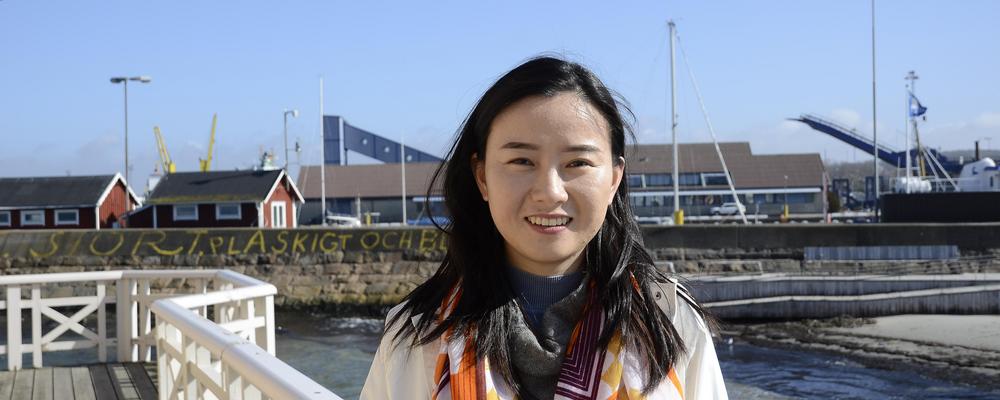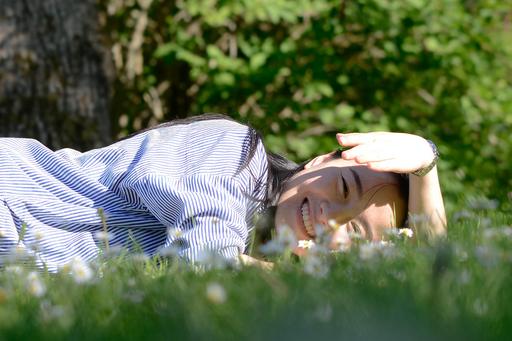
Xia's bold choice to come to Gothenburg to study Global Health became a real success story
For someone like Xia Zhao, who had rarely been outside of her province, the move to a foreign country was life changing. Despite major challenges, she persisted with her studies in the Global Health programme, found a job at an innovative company during her first year, and is now working on a master’s thesis that combines her interests in art and mental wellbeing.
How did you become interested in the Master’s Program in Global Health at the University of Gothenburg?
While I was doing my bachelor’s degree in Chinese herbalism, I realized that I was not really interested in looking for an active component in a herb or drug synthesis for a disease in general. I thought that factors like socioeconomic status, lifestyle, policy, or even transportation methods could affect health more than a treatment. That was why I started looking for health-related programmes with a stronger focus on humanity or social aspects. At the time, there was a master’s student in Sweden who started advertising on Chinese social media about master’s programmes in Nordic countries. Thanks to her, I first learned about Sweden and its quality education system. I also thought that the tuition fee in Sweden was reasonable compared to other countries. The global health programmes at the University of Gothenburg and Karolinska Institutet both caught my attention, but I decided that a two-year programme would be a better choice and decided to come to Gothenburg.
Did you face any challenges after moving to Sweden?
I would say the challenges started when I was still in China. My family did not support my decision to study abroad. They thought that paying a considerable amount of money for my tuition fee would be a waste, but I applied anyway. After I was accepted, my parents were still against the idea but eventually agreed to support me after I promised to earn my own living expenses. That motivated me to look for a job as soon as I arrived in Sweden. Another challenge was my poor English skills. I still remember the first group meeting I had with my team in global health. While everyone was discussing how to manage malaria in a very troubling setting (low incomes, poor infrastructure and governance, ongoing armed conflict), not a single word came out of my mouth. I could not fully understand what my colleagues were talking about. However, after two years, I can now say that I enjoy and feel more confident in expressing my opinions even though my English still needs a lot more improvement.
Given the diverse scope of the programme, could you briefly explain what you study in Global Health?
It is true that the programme is diverse in terms of the student body. Some of my colleagues were doctors but others had a degree in pharmacy, politics, geography, or public relations. Global Health is a multidisciplinary programme that covers introductory courses in global health, human rights, health governance, health economics, and epidemiology as well as offering an internship opportunity. I particularly enjoyed health economics because I got to learn about different healthcare systems and insurance models in different countries. I also appreciated my internship with Gynius Plus AB for giving me the opportunity to see how good commercial health product could contribute to health improvement.
Which aspects of the Global Health programme do you find useful for what you are doing now?
I am currently writing my master’s thesis on the impacts of visual arts on the mental wellbeing of elderly people with dementia. I cannot pinpoint a specific course that has helped me to write the thesis. Rather, the whole programme has given me the skills and motivated me to think about how I can combine my interest in arts with the current situation of dementia in elderly people. The programme has also taught me to be more critical when reading the news and commenting on it. Especially given the current pandemic, I have learned that my opinions must be backed up by informed and thorough research before participating in any conversation about it.
Do you have any advice for people interested in doing this programme?
Things might be difficult at the beginning, but good things will come if you are open to learning and eager to look for more opportunities. Take me, for example. I met my current boss at a restaurant at Sahlgrenska Science Park and that meeting led to a part-time and then full-time job at his company. I highly recommend newcomers to check out Sahlgrenska Science Park and other science parks for job opportunities. There are many companies doing international commerce and business, and you can find internships or jobs there.
Do you have a favourite Swedish health product or innovation?
I would say the colposcope developed by Gynius Plus AB. It is an optical colposcope used for cervical cancer screening, diagnosis as well as surgery assistance. Unlike normal colposcopes, which are rather chunky, this colposcope is light weight and portable so doctors can easily store it in a box and bring it with them when visiting rural areas or community healthcare centres. Another feature is that it is equipped with high quality lenses. People are often reluctant to use portable colposcopes for fear of lower optical quality, but this product shows that a smaller size does not mean a sacrifice of quality.
Written by Hannie, Student Content Team
